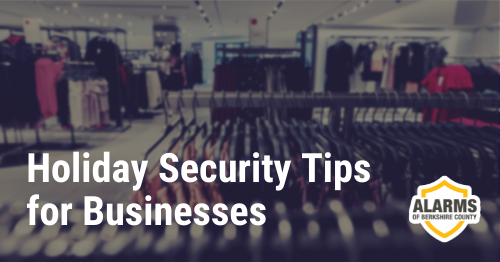Holiday Security Tips for Businesses
Posted on
Nothing says holiday cheer like twinkling lights and bright decorations, the hustle and bustle of crowds, and perhaps even a few days of rest and relaxation. Whatever the season holds for you, these holiday security tips for businesses can help you celebrate while staying secure.
Hiring Seasonal Staff
 With long lines of shoppers, waves of online orders, and incoming seasonal stock, almost all businesses could use extra hands around the holidays—and this year, the need is even greater. In the rush to hire temporary workers, it can be tempting to cut corners, but sacrificing your security protocols can leave your business burned.
With long lines of shoppers, waves of online orders, and incoming seasonal stock, almost all businesses could use extra hands around the holidays—and this year, the need is even greater. In the rush to hire temporary workers, it can be tempting to cut corners, but sacrificing your security protocols can leave your business burned.
Keep yourself protected by conducting thorough background checks on all prospective new employees, especially those who will be given keys or alarm passcodes for their opening or closing duties.
Once you’ve hired your seasonal staff, take the time to train them on your security policies. While they should only receive enough business information to do their jobs, emphasize the importance of security in all aspects. This will help trainees understand that your business takes security seriously—and will encourage them to follow suit.
Finally, after the holiday season is over, be sure to collect keys from all seasonal employees and disable their alarm passcodes.
Decorating Safely
As you deck the halls, ensure that decorations are chosen and placed carefully to avoid increasing the risk of fire, theft, and other dangers.
Surveillance cameras should never be blocked by decorations; in retail security systems, this is especially crucial at cash registers and safes. Any moving decorations should be placed away from motion detectors to avoid false alarms. Remember that outdoor décor, too, may blow and shift in the wind, so keep the entire area around surveillance cameras clear of garlands and inflatables to avoid potential obstructions.
Decorations should also not block emergency exit signs, fire extinguishers, or exterior doors. Retail stores will likely see increased foot traffic during the holiday shopping season, so it’s also important to consider the potential for crowding. Keep aisles as clear as possible to prevent tripping hazards and traffic bottlenecks. If an emergency occurs, building occupants must be able to exit the building as quickly and as smoothly as possible.
Unfortunately, one of the season’s most beloved decorations—the live Christmas tree—can put your business at risk of fire, as it can quickly dry out if not adequately watered. If you do opt for a live tree, place it away from heat sources, and appoint someone to regularly check and replenish the tree’s water reservoir.
Finally, consider your outdoor decorations from the viewpoint of a criminal passing by. Do large decorations create a convenient hiding spot for burglars to case the building? Does your eye-catching window display include high-value items that may tempt opportunistic thieves?
Testing Your Security Equipment
Your security equipment—including surveillance cameras, access control systems, and fire alarms—should always be tested regularly. If this has been on the back burner lately, now is the perfect time to make sure everything is in good working order. The closer the holidays get, the longer the wait times are likely to be for maintenance appointments, parts, and repairs.
Schedule a maintenance appointment with your security company, and give yourself the gift of peace of mind as you leave for the holidays.
Preparing for an Extended Shutdown
Whether you’ll be closing for a week’s vacation or a longer seasonal shutdown, be sure to make a list—and check it twice—to keep your business secure.
- Update Your Contact Information. Provide your security monitoring service with up-to-date contact information if the point person will change during the shutdown.
- Keep the Lights On. A business that’s well-lit inside and out is more secure, as it offers fewer hiding spots for intruders and vandals. Motion-detecting lights offer protection around the perimeter, while inside lights can be set on a timer. If possible, set a varied schedule, with lights turning on and off at random intervals instead of set times to give the appearance that the building is occupied.
- Do a Thorough Walk-Through. The last staff member out should take the time to ensure that all exterior windows and doors are locked and that all unnecessary electronics are switched off. Any space heaters in the building should be unplugged, and the thermostat should be set to at least 55° to prevent burst pipes.

